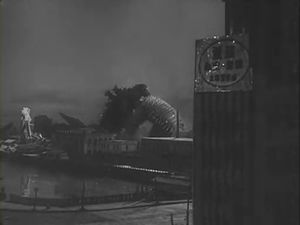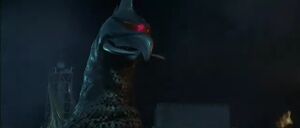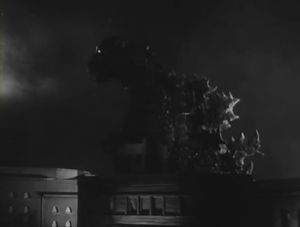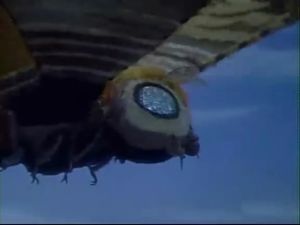Godzilla
Daikaiju Gojira (大怪獣 ゴジラ), better known by his on-screen moniker Godzilla, was a giant radioactive mutant dinosaur and one of Japan's foremost film stars for nearly half a century. On-screen, Godzilla was known for his legendary acting range; he could play anything from an evil giant mutant dinosaur to a benevolent giant mutant dinosaur to an anti-heroic giant mutant dinosaur, and everything in-between.
Off-screen, Godzilla was known for his brooding and often complex personal life. Of note are the friendships he forged with many of his costars (most notably Rodan, Anguirus and King Ghidorah); his tumultuous and sometimes rocky relationship with female costar Mothra; and his infamous radiation addiction, which finally cost the monster his life in 1995.
Early life
Daikaiju Gojira was born to a small family of modest means on Lagos Island on May 31, 1934. His father, a fellow Godzillasaurus, worked as the island's alpha predator, catching and killing wild boars to maintain his family.
Gojira's childhood was typical of other surviving dinosaurs. However, in 1944, Gojira had his first encounter with humankind. In his autobiography, simply titled Gojira: My Song (Toho Press, 1992), he reflects:
| “ | Though I didn’t know this at the time, the island had been garrisoned by a small contingent of the Japanese Imperial Army. Later, the Americans came to drive them out. I had a bit of a, shall we say, altercation with the Americans as they landed on the beach. | ” |
After this brief moment of intrigue, however, Gojira's life would remain fairly benign until his next encounter with humankind, this time in the early 1950s. At some point– Gojira doesn't remember when– his island served as a test site for nuclear weapons. The resulting radiation killed off Gojira's entire family, as well as all life on the island, but had the odd effect of making Gojira fifty meters tall and giving him super powers. Gojira, enraged at the death of his family, vowed to destroy humankind. In his biography he writes:
| “ | I made a promise to myself that day to have my revenge on humankind. Naturally, this revenge would take the form of my constantly attacking the same four [Japanese] cities while leaving the rest of the world completely unharmed. However, if space aliens or evil monsters were to attack, I would defend humankind from them so that later I could continue destroying humankind. Yes, after having just saved them. I know. It’s complicated. | ” |
Film career: Shōwa period
Just as Gojira was preparing to destroy Tokyo, however, he received word from his friend at the time– fellow monster Oodako the giant octopus– that movie company Toho was in the process of holding auditions for the lead role in an upcoming as-of-yet-untitled monster movie. Gojira jumped at the opportunity, as he "had always wanted to star in a movie... destroying mankind could wait a bit, I suppose."
1954–55: Godzilla and Godzilla Raids Again
Gojira did well at the auditions and hands-down earned the lead in the film, beating out eventual costars Anguirus and Rodan. The movie was still without a title, though, and it was suggested that the film be named after the leading monster. However, director Ishiro Honda thought "Daikaiju Gojira" would make for an awkward movie title. He coined the nickname "Godzilla" for the lead, which would also come to serve as the film’s title.
Now with a lead and a title production of Godzilla could finally begin. The undertaking was one of the most expensive ventures in film history: it called for a life-size, fully functioning model of Tokyo to be built out of cardboard, all at the studio's expense.
Godzilla (the film) was a massive critical and commercial success and catapulted Godzilla (the monster) into the international spotlight. Because of the success of Godzilla, Toho decided to hastily make a sequel to capitalize on their hit. What resulted was Godzilla Raids Again, a film marred by a hurried script and numerous instances of production corner-cutting. Instead of building a life-sized model of Osaka, for instance, Toho studios decided to use the actual Osaka during filming; millions died. Furthermore, the film was received poorly by critics.
The failure of Godzilla Raids Again looked like it would essentially end Godzilla's career. He reflects:
| “ | I was washed up ... finished. I had my brief time in the spotlight, and now– for the moment, at least– it was gone. Such is life. There was nothing for me to do now besides take my bows, pay my dues, and move on. | ” |
1955–62: Hiatus

Although Godzilla Raids Again was a failure, it did introduce Godzilla to Anguirus, as the two were costars. After both were chased out of the Japanese film industry, they became close friends and bought a lot together on Monster Island. Japanese tabloids of the time ran sensational stories that the two were homosexual lovers, a claim Godzilla denied to his death and Anguirus denies to this day.
Godzilla's retirement would last seven years. Then, in 1962, an American monster by the name of King Kong came to Godzilla with an intriguing offer.
1962: Second chance, King Kong vs. Godzilla
King Kong asked Godzilla to star in an American-Japanese co-production which was to be titled King Kong vs. Godzilla. Godzilla jumped at the opportunity:
| “ | This was a second chance, of sorts, a chance to revive my career. I still wanted to act and, needless to say, when the opportunity to do so literally came knocking at my door, I jumped at the chance. Plus, I’d always thought King Kong was a bit full of himself, so the opportunity to knock him down a peg or two tickled me a bit. | ” |
Although the script called for King Kong to win, Godzilla didn't particularly mind. The film was a rousing success and revived Godzilla's career. Ironically enough, King Kong's career went into something of a downward spiral after King Kong vs. Godzilla: His next three film ventures– King Kong Escapes, King Kong (a remake of the original, starring Kong in an ironic, humorous role), and King Kong Lives– all failed miserably, though another remake in 2005 revived his popularity. He is now actively seeking to appear in an upcoming American Godzilla production.
1963–65: Prime years
King Kong vs. Godzilla was followed by Mothra vs. Godzilla, a film important to Godzilla in more ways than one. Firstly, the film cemented his career and ensured he would be a mainstay in films for years to come. Secondly, the film introduced Godzilla to Mothra, a promising young actress fresh off her own successful movie. Although the two were enemies on-screen, off the screen they were reportedly quite flirtatious. The two eventually began a romantic relationship.
Godzilla's next film, Ghidorah the Three Headed Monster, was another massive success, as well as another important movie in the way of his personal life. For the first time, he got to work extensively with Rodan, a monster he had auditioned with in 1954. The two formed a friendship and would frequently collaborate in the years to come.
Godzilla was also introduced to King Ghidorah, an ambitious up-and-coming multi-headed dragon from outer space. Godzilla has said on many occasions that King Ghidorah was "the finest actor" he'd ever worked with.
After the success of yet another film, Godzilla was at the peak of both his popularity and his bankability. Shortly after shooting ended for Ghidorah the Three Headed Monster, Godzilla and Mothra married on Monster Island. The union produced children– a set of twins named Mothra Larva #1 and Mothra Larva #2– later that same year.
Godzilla’s next film was the ambitious Godzilla vs. Monster Zero. In addition to three of the four leads from the previous film reprising their roles (Mothra had opted out due to maternal duties), Toho contracted the Xillians– a race of aliens who bore an incredibly odd resemblance to Japanese men in jump suits– to serve as the film's antagonists. The script called for a great deal: flying saucers, major cities, other planets (all faithfully built to scale out of cardboard) and more, making this one of the most expensive films to date.
With yet another success under his belt, Godzilla's fame clearly began to go to his head, and he succumbed to the temptations of both sex and drugs. On his first experimentation with radiation, he reflects:
| “ | I was first introduced to freebase radiation by Gamera sometime after I did Monster Zero. It was at a party, I recall: this kaiju get-together in Tokyo Bay. Gamera comes up to me and says, ‘Goji, baby, you've got to try this, baby, it’s fabulous!’ So I tried some. I spent the next two months ‘asleep’ on the ocean floor... I couldn’t get enough. | ” |
1966–75: Downward spiral

Although Gamera's experimentation with radiation ended shortly after it began, Godzilla became addicted. The shooting of Godzilla's next film, Godzilla vs. the Sea Monster, was hindered by the monster and his sixty-trillion-yen-a-day habit. Filming would have to be stopped, sometimes for days at a time, so that Godzilla could get his fix. The movie was poorly received.
After Godzilla vs. the Sea Monster, Godzilla and Mothra had their third child, Minilla. However, the child was born a "radiation baby" and died in 1969 at just two years of age, with three film appearances. Although this proved to be a massive shock to Godzilla and Mothra's relationship, the two managed to stay together for another three years.
Allegations that Godzilla had begun an illicit affair with younger actress Gigan in 1972 finally pushed Mothra over the edge. Though neither Godzilla nor Gigan admitted to anything publicly, the very public tabloid allegations and scrutiny proved to be too much for Mothra, and she divorced Godzilla later that same year. Mothra retained custody of both their surviving children, and retired from acting to reside on Infant Island.
Godzilla would go on to star in eight more films, but none were as prestigious or as well-received as those he did earlier in his career. Still addicted to radiation, he finally retired from acting in 1975.
Retirement
Single and no longer acting, Godzilla began freebasing radiation on a daily basis. Godzilla reflects:
| “ | I tried it all: Soviet and American nuclear submarines, geothermal radiation, nuclear spills, and even the occasional on-land power plant. I have to say, Japan has the finest radiation in the world, although the Chinese know what they’re doing too. Korea... well, let me just say this: when you’re in Korea, don’t metabolize their radiation; the comedown is awful. | ” |
Godzilla's radiation habit caused him to gain a great deal of weight. He ballooned to fifty thousand tons and shot up to eighty meters in height, nearly double his size when in his acting prime. Godzilla had seemingly hit rock bottom. But then, in 1984, an exciting offer came his way. Godzilla's career was about to be revived– again.
Return to film: Heisei period
This intriguing offer happened to be a film role, Godzilla's first in almost a decade. Toho approached the monster, offering him the lead role in a remake/reboot/reimagining of his first role in the creatively titled Godzilla. Godzilla accepted readily.
Godzilla (the remake) was a rousing success, and it skyrocketed the now-aged Godzilla (the monster) into the spotlight once again, prompting him to get off the "radiation horse" for the first time in almost twenty years. Despite its success, Godzilla would have to wait another five years to get another role, this time alongside lovely female costar Biollante in the creatively titled Godzilla vs. Biollante. Although the film's box office performance was disappointing, it introduced Godzilla to what proved to be the second great romance in his life.
Godzilla and Biollante made their relationship public shortly after the release of their film. Initially, tabloids made quite a fuss over the substantial age difference between the two monsters (Godzilla was 55, Biollante less than a year old), but quickly warmed to the couple. However, their romance was cut short when Biollante, who had a history of depression, committed suicide in the middle of Tokyo Bay in 1990. The JSDF came quickly to the scene, and found that Biollante had slit all six of her tendril-like appendages, dying quickly. Godzilla called this the "greatest tragedy" of his entire life, and it prompted him to enter the deadly world of radiation once again.
Godzilla would go on to make four more movies, but all were overshadowed by his constant radiation use. By the time of his death in 1995, Godzilla's radiation use had bloated him to the absurd size of a hundred meters and sixty thousand tons.
Death and legacy
Godzilla died in 1995, after a massive radiation overdose. To this day, he remains one of the most influential actors who ever lived (to Godzillasaurus actors in particular). Largely in his honor, a new generation of Japanese Godzillasaurus actors has taken up the mantle of "Godzilla", starring in half a dozen films of their own. Godzilla also served as the inspiration behind American rapper Zilla's ill-fated remake of the original film in 1998.
In 1996 Godzilla was awarded a spot on the Hollywood Walk of Fame.
In 2014, Godzilla Jr., a secret bastard child Godzilla had with an unnamed mistress, starred in yet another remake of the original film, produced by Warner Bros. in their, what is it, 4th attempt at at a Marvel-esque cinematic universe? The film was actually decent, and from it spawned the Monsterverse, a series of films which also helped to revive King Kong's film career (although by this point, Universal owned the name "King Kong", so in these movies, he just goes by "Kong"). This series is going strong to this day, and has been invaluable at highlighting the injustice that kaiju actors face, even in the modern day, The MonsterVerse is now the somehow pretty much the only living cinematic universe. Why? Because Radioactive Lizard punch Giant Monkey = $$.






